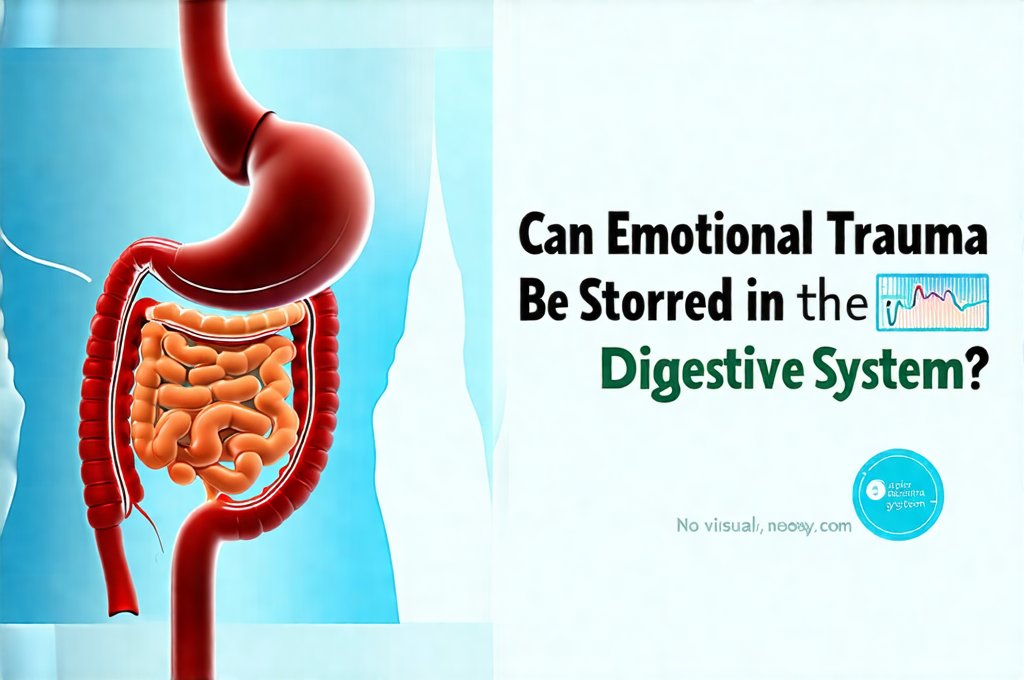The connection between our minds and bodies is undeniable, yet often underestimated. We readily acknowledge how stress impacts our mental state – anxiety before a presentation, sadness after loss – but less frequently consider how profoundly psychological experiences shape our physical wellbeing, particularly within the digestive system. For centuries, intuitive healers have recognized a link between emotional distress and gut health, observing that unresolved trauma can manifest as physical symptoms like irritable bowel syndrome (IBS), chronic bloating, or unexplained stomach pain. Modern science is now beginning to validate these observations, uncovering intricate pathways through which emotional experiences can indeed influence the digestive system, and potentially become “stored” within it – not as memories in a traditional sense, but as physiological changes impacting its function and sensitivity.
This isn’t about imagining emotions literally residing in your stomach; rather, it’s about understanding how trauma impacts the complex interplay between the brain, nervous system, hormones, and immune responses that all influence gut health. The digestive system is remarkably sensitive to emotional state, acting as a kind of barometer for our internal world. When we experience stress or trauma, our bodies trigger physiological changes designed for immediate survival – the “fight-or-flight” response. While crucial in acute situations, chronic activation of this response can disrupt normal digestive processes, leading to inflammation, altered motility (movement of food), and increased visceral hypersensitivity (heightened perception of gut sensations). Exploring these connections is essential not only for understanding chronic digestive issues but also for developing more holistic approaches to healing that address both the emotional and physical dimensions of wellbeing. Considering how acid reflux might change based on these factors is important too.
The Gut-Brain Axis: A Two-Way Street
The key to understanding how trauma can affect the digestive system lies in appreciating the profound connection known as the gut-brain axis (GBA). This isn’t a single pathway, but rather a complex bidirectional communication network linking the central nervous system (brain and spinal cord) with the enteric nervous system – often called the “second brain” – which resides within the walls of our digestive tract. This intricate web involves neural pathways, hormonal signals, immune responses, and even the microbiome (the trillions of bacteria living in our gut).
- The vagus nerve is a major component of the GBA, acting as a direct communication line between the brain and gut, relaying information about digestion, inflammation, and emotional state. Trauma can disrupt vagal tone – the level of activity within this nerve – impacting digestive function and emotional regulation.
- Neurotransmitters like serotonin (often called the “happy hormone”) are heavily produced in the gut. In fact, approximately 90% of serotonin is made there! Stress and trauma can alter neurotransmitter production and availability, potentially influencing mood, appetite, and digestive processes.
- The microbiome plays a critical role in modulating the GBA. Trauma and chronic stress can negatively impact the composition and diversity of the gut microbiome, leading to dysbiosis (an imbalance) which has been linked to various physical and mental health issues. Restoring pH balance can support a healthy microbiome.
Therefore, emotional experiences aren’t just “in your head”; they directly influence the physiology of your gut, and conversely, the state of your gut profoundly impacts your brain function and emotional wellbeing. This creates a feedback loop where trauma can trigger digestive symptoms, which in turn exacerbate emotional distress, perpetuating a cycle of suffering. This bidirectional relationship is what makes addressing emotional trauma so crucial for long-term gut health. It’s also worth understanding digestive enzymes and their role in this process.
How Trauma Impacts Digestive Physiology
Trauma fundamentally alters the way our bodies respond to stress, leading to physiological changes that can manifest as digestive symptoms. When we experience a traumatic event, the hypothalamic-pituitary-adrenal (HPA) axis – our body’s primary stress response system – becomes overactive. This leads to increased cortisol production, the “stress hormone.” While cortisol is essential for survival in acute situations, chronically elevated levels can wreak havoc on the digestive system:
- It suppresses immune function, making us more vulnerable to inflammation and gut permeability (“leaky gut”).
- It disrupts digestion by slowing down or speeding up motility (the movement of food through the digestive tract), leading to bloating, constipation, diarrhea, or abdominal pain.
- It alters the microbiome, creating an environment that favors harmful bacteria and reduces beneficial ones.
Beyond cortisol, trauma can also lead to increased sensitivity in the visceral nervous system – the network of nerves responsible for sensing sensations within the gut. This heightened sensitivity, known as visceral hypersensitivity, means even normal digestive processes can be perceived as painful or uncomfortable. Furthermore, unresolved emotional trauma often leads to muscle tension, particularly in the abdomen and diaphragm, which can physically restrict digestive function and contribute to symptoms like bloating and constipation. Essentially, trauma rewires the digestive system’s response to stimuli, making it more reactive and sensitive. If you experience upper spine pain along with these symptoms, there may be a connection.
The Role of Inflammation
Chronic inflammation is a hallmark of many digestive disorders, and emotional trauma plays a significant role in driving this inflammatory process. When we experience stress or trauma, our immune system shifts into high alert, releasing pro-inflammatory cytokines – signaling molecules that promote inflammation. While initially intended to protect us from harm, chronic activation of the immune system can lead to systemic inflammation, damaging gut tissues and disrupting its normal function.
This inflammation isn’t just limited to the digestive tract; it’s linked to a wide range of health problems, including anxiety, depression, autoimmune diseases, and cardiovascular disease. The gut microbiome is also deeply involved in this inflammatory process. Dysbiosis – an imbalance in the gut bacteria caused by trauma – can increase intestinal permeability (“leaky gut”), allowing bacterial toxins and undigested food particles to enter the bloodstream, triggering further inflammation. Addressing inflammation through diet, lifestyle changes, and emotional healing is crucial for restoring gut health.
Somatic Experiencing & Trauma Release
Somatic experiencing (SE) is a body-oriented therapy designed to address trauma by focusing on the physical sensations associated with traumatic memories. It’s based on the idea that trauma isn’t just stored as cognitive memories, but also as sensations in the body – tightness, pain, numbness, or hyperarousal. SE helps individuals gently re-engage with these bodily sensations in a safe and regulated way, allowing them to process and release trapped trauma energy.
The techniques used in SE involve:
1. Tracking bodily sensations without judgment.
2. Noticing where the sensations are located.
3. Allowing the body to naturally unfold and release tension.
By addressing the physical manifestations of trauma, SE can help reduce visceral hypersensitivity, restore vagal tone, and improve gut function. Other body-centered therapies like yoga, mindfulness, and dance/movement therapy can also be beneficial for releasing trauma stored in the body and improving digestive health. These modalities offer a gentle yet powerful way to reconnect with your body and heal from past traumas.
Diet & Lifestyle Interventions
While therapy is often essential for addressing the emotional component of trauma, dietary and lifestyle changes can significantly support gut healing and reduce symptoms. A diet rich in whole, unprocessed foods – fruits, vegetables, lean proteins, and healthy fats – provides the nutrients needed to nourish the gut microbiome and reduce inflammation. Specifically:
* Probiotic-rich foods: Yogurt, kefir, sauerkraut, kimchi, and kombucha can help restore a healthy balance of gut bacteria.
* Prebiotic-rich foods: Onions, garlic, asparagus, bananas, and oats feed beneficial bacteria in the gut.
* Fiber-rich foods: Whole grains, fruits, and vegetables promote regular bowel movements and support digestive health.
Beyond diet, managing stress through techniques like meditation, deep breathing exercises, and spending time in nature can help regulate the HPA axis and reduce cortisol levels. Regular physical activity also plays a crucial role, as it helps release endorphins (natural mood boosters) and reduces stress hormones. Adopting a holistic approach that integrates emotional healing with lifestyle changes is essential for long-term gut health and wellbeing. And understanding how bitter foods can support your digestive system is also beneficial.


















